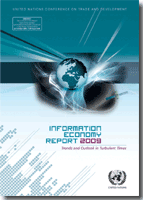
| Developed countries | US$ 60.00 |
| Developing countries | US$ 60.00 |
| Least Developed Countries | US$ 60.00 |
The Information Economy Report 2009: Trends and Outlook in Turbulent Times isthe fourth in a series published by the United Nations Conference on Trade andDevelopment (UNCTAD). The report is one of the few publications to monitorglobal trends in information and communication technologies (ICTs) as they affectdeveloping countries. It serves as a valuable reference for policymakers inthose nations. It gives special attention to the impact of the global financial crisis on ICTs.
Contents:
- Global and regional trends in the diffusion of ICTs such as fixed and mobiletelecommunications, Internet, and broadband
- Ranking of the most dynamic economies in terms of increased ICT connectivitybetween 2003 and 2008
- Monitoring of the “digital divide”
- Survey of national statistical offices on the use of ICT in the business sector
- A review of the changing patterns in the trade of ICT goods
- A mapping of the new geography in the offshoring of IT and ICT-enabled services.
- Policy recommendations on how developing countries can reap greaterbenefits from ICT
- A statistical annex with global ICT data.
The Information Economy Report 2009 (IER 2009) offers a fresh assessment of thediffusion of key ICT applications between 2003 and 2008. While fixed telephone subscriptionsare now in slight decline, mobile and Internet use continues to expand rapidlyin most countries and regions. At the same time, there is a widening gap betweenhigh-income and low-income countries in broadband connectivity. Broadband penetrationis now eight times higher in developed than in developing countries. The reportexplores policy options for countries seeking to improve broadband connectivity.
The IER 2009 includes a chapter on the use of ICTs in the business sector. Drawingon unique data, it examines how ICT use differs both between and within countries,highlighting the rural-urban divide as well as that between large and small companies.The report recommends that governments in developing countries give more attentionto ICT uptake and use by small- and medium-sized enterprises (SMEs), as they arelagging behind larger firms. And it discusses those aspects of ICT where governmentintervention can make a difference.
A third chapter is devoted to the impact of the financial crisis on ICT trade. While agrowing share of exports of ICT goods and services is accounted for by developingeconomies, especially in Asia, the crisis has affected goods and services quite differently.ICT goods are among the categories of trade most negatively affected by therecession, while IT and ICT-related services appear to be among the most resilient.A statistical annex to the report provides data on ICT infrastructure, ICT use, and ICTtrade for up to 200 economies. A PDF version of the IER 2009 and its statistical annex aredownloadable from the UNCTAD website (www.unctad.org/ier) from 23 October 2009.
For more information about UNCTAD’s work on ICT for Development please contact:
ICT Analysis Section
e-mail: ict4d@unctad.org
Telephone: +41 22 917 55 91
Fax: +41 22 917 00 52



